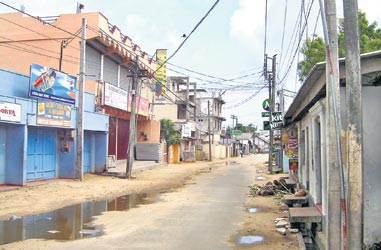|
Strategic
city struggles for sheer survival
Nightmare for 50 children cut away
from their parents and other agonizing stories
By Chris Kamalendran
Trincomalee: Five months after a cycle
bomb attack at the market place here drastically changed
the security situation, life is yet to return to normal
for residents, traders, hotels owners and others. Most
shops put up shutters well before dusk, fishermen have
been restricted in their activities and most public
transport comes to a standstill as dusk falls.
The hotels that had a flourishing
business no longer have sufficient guests prompting
some of them to close down or scale down operations.
 |
| Scenes from a deserted Trincomalee
town |
Those that are functioning are finding
it difficult to get supplies with some of them being
forced to buy fish from Chillaw to cater to their guests
who are mainly foreigners working for International
Non governmental Organisations.
“As long as there are activities
involving INGOs we have some business and our rooms
are occupied. But otherwise, we hardly have any guests,”
says Rohihtha de Silva General Manager of Welcome Bay
hotel, one of the main hotels in the area.
“When the situation was normal
we used to have full bookings and even locals were patronizing
the place in large numbers,” he said.
Within the town some 2,000 displaced
people are languishing in six schools. Most of them
have fled from adjoining villages that have seen intense
artillery and mortar attacks between government troops
and the LTTE.
In the town, every 100 metres is dotted
with check points manned by police, army or homeguards.
Push cycles and motor cycle are thoroughly searched
as some of them have been used for attacks by the Tigers
in the past.
The increased attacks in Trincomalee
town – including claymore mine attacks on the
security forces and a series of shooting incidents –have
prompted the security forces to intensify their searches.
“With the LTTE setting up mines
even on push cycles we cannot take a chance,”
says a policeman manning one of the many check points
in the town.
The scene of the devastated market
place where the cycle bomb went off on the eve of the
Sinhala – Hindu new year where at least 19 peoples
were killed and 36 shops were damaged, has remained
unchanged. Most of the shop keepers have opted to keep
the shops in the same condition.
“We were first offered compensation,
but later we were told we would have to obtain a loan.
But most of us are reluctant to rebuild our shops as
we fear they would be affected again,” says President
of the Trincomalee district Chamber of Commerce Raja
Rajmohan.
He says that since April, Banks have
restricted their credit limit while some of the main
companies also have curtailed their credit facilities.
Mr. Rajamohan says many of the businessmen
were already facing financial difficulties and if the
situation continues for another three months they will
be badly hit.
Shops put up shutters by about 4 p.m
as the town gradually starts getting deserted.
Private bus services keep off roads
after dusk while many of the villagers keep away from
the town due to lack of transport.
The fisheries industry is among the
worst affected with most fishermen being forced to restrict
their fishing to shallow water fishing during the day
and that too only for a limited number of hours. Fishing
boats which otherwise would have been at sea can be
seen along the shore surrounding Trinco town, Nilaveli
and Uppuveli areas.
Some of the fishermen have left the
area and gone to Mannar and others have left to India.
Visitors to Trincomalee feel and see
the effects of the security situation when they go along
the Habarana Trincomalee road. The number of vehicles
have drastically reduced. According to police some 1000
to 1200 vehicles travelled along this road, but now
there are only about 200 vehicles a day.
The cross loading checkpoint where
all items brought in lorries are unloaded and checked
by the police has been attributed as another reason
for the reduction of vehicles. The checkpoint is similar
to what was put up at Omanthai where all vehicles entering
the uncleared areas and those leaving the uncleared
areas are searched.
The check point came up three months
back as a security precaution to safeguard the Trinomalee
town as well as prevent smuggling of weapons , ammunition
or explosives from Trincomalee to the rest of the county.
Government Agent for Trincomalee,
Ranjith Silva told The Sunday Times that sporadic incidents
taking place on a day to day basis was affecting normality
in the town.
He said that many of the Muslims and
Sinhalese displaced from Muttur have returned, but the
Tamil civilians were not returning due to threats from
the LTTE.
However displaced Tamil civilians
said that there was no guarantee about their security,
as even before the full scale fighting started several
civilians had been abducted and killed when they were
on their way to town.
As Trincomalee struggles with the
deteriorating security situation and uncertainty the
security forces have been able to secure some of the
surrounding areas of the town including Sampur and Mutur.
In Muttur most of the displaced people
have returned, but the reconstruction work has been
slow while in Sampur the displaced are yet to return.
|
